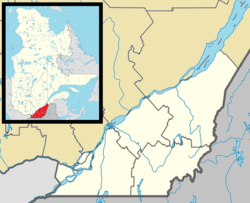Princeville, Quebec
Princeville | |
|---|---|
 View of Princeville circa 1930. | |
| Motto(s): Droit et Loyal (French for "Right and Loyal") | |
 Location within L'Érable RCM. | |
| Coordinates: 46°10′N 71°53′W / 46.167°N 71.883°W[1] | |
| Country | |
| Province | |
| Region | Centre-du-Québec |
| RCM | L'Érable |
| Constituted | February 23, 2000 |
| Government | |
| • Mayor | Gilles Fortier |
| • Federal riding | Mégantic—L'Érable |
| • Prov. riding | Arthabaska |
| Area | |
| • Total | 196.70 km2 (75.95 sq mi) |
| • Land | 195.01 km2 (75.29 sq mi) |
| Population (2021)[3] | |
| • Total | 6,218 |
| • Density | 31.9/km2 (83/sq mi) |
| • Pop 2016-2021 | |
| • Dwellings | 2,903 |
| Time zone | UTC−5 (EST) |
| • Summer (DST) | UTC−4 (EDT) |
| Postal code(s) | |
| Area code | 819 |
| Highways | |
| Website | www |
Princeville is a city in the Canadian province of Quebec, located in L'Érable Regional County Municipality in the Centre-du-Québec region.
The population was 6,218 as of the Canada 2021 Census.
History
[edit]The county of Stanfold (Princeville) was created by Édouard Leclerc on July 9, 1807 when he established himself on lot 6, rang 12 in Princeville. A monument was erected in his honour on the east section of the 12th rang. Stanfold then had a new division that would become the village of Princeville in 1856. Thus two municipalities would now co-existed.
On February 23, 2000, the municipalities of the city of Princeville and the parish of Princeville become one to form the new city of Princeville.
Geography
[edit]Covering an area of 195.01 km2, Princeville is crossed by the Bulstrode River, 81 km south of Trois-Rivières, 145 km from the border of the US state of Maine and 70 km from Drummondville.
Demographics
[edit]In the 2021 Census of Population conducted by Statistics Canada, Princeville had a population of 6,218 living in 2,781 of its 2,903 total private dwellings, a change of 3.6% from its 2016 population of 6,001. With a land area of 195.01 km2 (75.29 sq mi), it had a population density of 31.9/km2 (82.6/sq mi) in 2021.[4]
| 2021 | 2016 | 2011 | |
|---|---|---|---|
| Population | 6,218 (+3.6% from 2016) | 6,001 (+5.4% from 2011) | 5,693 (+2.2% from 2006) |
| Land area | 195.01 km2 (75.29 sq mi) | 195.26 km2 (75.39 sq mi) | 194.02 km2 (74.91 sq mi) |
| Population density | 31.9/km2 (83/sq mi) | 30.7/km2 (80/sq mi) | 29.3/km2 (76/sq mi) |
| Median age | 41.2 (M: 40.8, F: 42) | 40.9 (M: 39.6, F: 42.3) | 41.2 (M: 40.6, F: 41.8) |
| Private dwellings | 2,903 (total) | 2,702 (total) | 2,497 (total) |
| Median household income | $62,000 | $50,944 | $44,611 |
References
[edit]- ^ "Banque de noms de lieux du Québec: Reference number 51235". toponymie.gouv.qc.ca (in French). Commission de toponymie du Québec.
- ^ a b "Répertoire des municipalités: Geographic code 32033". www.mamh.gouv.qc.ca (in French). Ministère des Affaires municipales et de l'Habitation.
- ^ a b c "2021 Community Profiles". 2021 Canadian census. Statistics Canada. February 4, 2022. Retrieved 2023-12-27.
- ^ "Population and dwelling counts: Canada, provinces and territories, and census subdivisions (municipalities), Quebec". Statistics Canada. February 9, 2022. Retrieved August 29, 2022.
- ^ "2016 Community Profiles". 2016 Canadian census. Statistics Canada. August 12, 2021. Retrieved 2022-07-28.
- ^ "2011 Community Profiles". 2011 Canadian census. Statistics Canada. March 21, 2019. Retrieved 2022-07-28.
- ^ "2006 Community Profiles". 2006 Canadian census. Statistics Canada. August 20, 2019.
- ^ "2001 Community Profiles". 2001 Canadian census. Statistics Canada. July 18, 2021.
External links
[edit]


 French
French Deutsch
Deutsch
